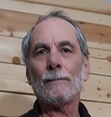Ed Teja's Blog, page 3
January 26, 2018
A Story from Cartagena
This is part of the old Spanish wall that was built around the city of Cartagena, Colombia between the late 1500 and 1796. It was intended to keep the Caribbean pirates out--and Johnny Depp wasn't even born yet.
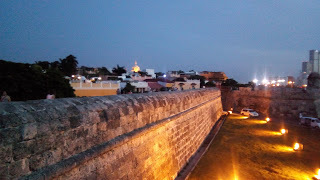
When J. Lee Porter and I were visiting Cartagena this month (Jan 2018) it inspired us as a location for a story about an expat. The character we came up with is not a typical expat, nor a good person, but sometimes justice prevails. It's also a story within the theme of cryptocurrency that we are using for the novels in progress. We are looking at the disruptive nature of the technology, not just on finance, but on people's lives. Change, disruption, brings good and bad, and you don't get to choose which parts you want and which you can ignore. It's a complete package.
A number of institutions and moralists will (and are) argue that cryptocurrency is a spawn of the devil because bad people use it. That's quite true. Any innovation gets used and the intentions of the inventor don't necessarily get taken into account. That doesn't make the invention bad. Henry Ford wasn't a serial hit and run artist, to the best of my knowledge.
At any rate, this story will be out soon (published by Nomadic Giant https://www.nomadicgiant.com). Besides the fact that we got inspired and just started writing the story in Colombia--it just came bursting out, we love the idea that we will have something tangible to give you a taste of where we are going with the Bitpats series. Just a taste, mind. The scope of a short story is far different than that of a novel, and even further removed from that of a series of books.
We will be in Mexico next month, at the Anarchapulco Conference -- yup, it's a real thing (https://anarchapulco.com), where issues around cryptocurrency and personal freedom are bandied about. It should be a great deal of fun and education as well. Should be grist for the mill.

When J. Lee Porter and I were visiting Cartagena this month (Jan 2018) it inspired us as a location for a story about an expat. The character we came up with is not a typical expat, nor a good person, but sometimes justice prevails. It's also a story within the theme of cryptocurrency that we are using for the novels in progress. We are looking at the disruptive nature of the technology, not just on finance, but on people's lives. Change, disruption, brings good and bad, and you don't get to choose which parts you want and which you can ignore. It's a complete package.
A number of institutions and moralists will (and are) argue that cryptocurrency is a spawn of the devil because bad people use it. That's quite true. Any innovation gets used and the intentions of the inventor don't necessarily get taken into account. That doesn't make the invention bad. Henry Ford wasn't a serial hit and run artist, to the best of my knowledge.
At any rate, this story will be out soon (published by Nomadic Giant https://www.nomadicgiant.com). Besides the fact that we got inspired and just started writing the story in Colombia--it just came bursting out, we love the idea that we will have something tangible to give you a taste of where we are going with the Bitpats series. Just a taste, mind. The scope of a short story is far different than that of a novel, and even further removed from that of a series of books.
We will be in Mexico next month, at the Anarchapulco Conference -- yup, it's a real thing (https://anarchapulco.com), where issues around cryptocurrency and personal freedom are bandied about. It should be a great deal of fun and education as well. Should be grist for the mill.
Published on January 26, 2018 10:53
January 12, 2018
Hunting Locations
A sense of place is important to my stories. Incorporating the textures, sounds, essences of a place is part of my writing process. I'm in Medellin Colombia this week, with my coauthor J. Lee Porter, learning all we can for the series of techno-thrillers we have in the works.
Yesterday we took a trip up to Santo Domingo, high above the city.
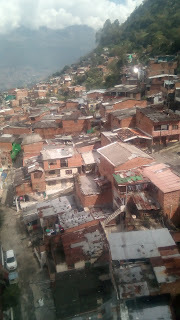 While it might not seem the most interesting area for tourists, when we got off the areal tram ride, and even going over it, the clusters of homes, the personalization visible even among similar places, made me think of the people living there. Now there is no way I can put myself in their shoes, but being here made me realize that it was a great place for the action in Book two of our work in progress. So I'll be going back to learn more.
While it might not seem the most interesting area for tourists, when we got off the areal tram ride, and even going over it, the clusters of homes, the personalization visible even among similar places, made me think of the people living there. Now there is no way I can put myself in their shoes, but being here made me realize that it was a great place for the action in Book two of our work in progress. So I'll be going back to learn more.
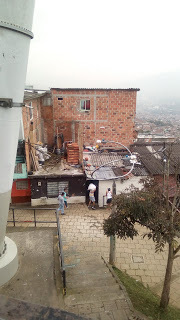
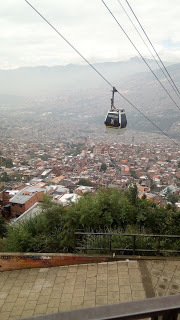 The cable run is 4000 meters long with four stations dotting the run as it comes up from the metro station.
The cable run is 4000 meters long with four stations dotting the run as it comes up from the metro station.
Yesterday we took a trip up to Santo Domingo, high above the city.
 While it might not seem the most interesting area for tourists, when we got off the areal tram ride, and even going over it, the clusters of homes, the personalization visible even among similar places, made me think of the people living there. Now there is no way I can put myself in their shoes, but being here made me realize that it was a great place for the action in Book two of our work in progress. So I'll be going back to learn more.
While it might not seem the most interesting area for tourists, when we got off the areal tram ride, and even going over it, the clusters of homes, the personalization visible even among similar places, made me think of the people living there. Now there is no way I can put myself in their shoes, but being here made me realize that it was a great place for the action in Book two of our work in progress. So I'll be going back to learn more.
 The cable run is 4000 meters long with four stations dotting the run as it comes up from the metro station.
The cable run is 4000 meters long with four stations dotting the run as it comes up from the metro station.
Published on January 12, 2018 03:40
December 27, 2017
The different faces of fishing
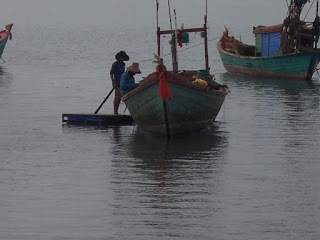
The photo above is one I took in Vietnam. We were there a short time, in 2012 and didn't get much chance to hang out with the fishermen. I regret that.
I'm intrigued by the similarities and differences of rural peoples, and in particular, fishermen, which is curious, because I'm lousy at fishing. Fishing villages and the fishing folk are far more interesting to me than tourist destinations.
Dagny (who catches far more fish than I) and I spent one of our years in Venezuela, a little more than that, actually, living among the scattered fishing villages along the north coast of the Golfo de Carriaco. We became friends with the fishing families and learned to respect their craft, their lives.
The picture below is me (at the motor) and T-Bone Fisher out in my penero on the Golfo... on the way back from making a beer run to Cumana. I bought a 40HP Suzuki, much to the disdain of the fishermen who are big Yamaha fans. Although we left long ago, and T-Bone is (I think) dead now, the boat and motor are still there.
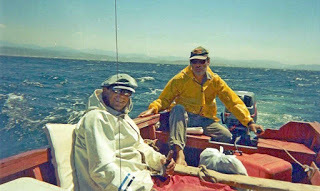
On the trip to Colombia that starts next week, I intend to visit a fishing village. I expect it will similar to the ones in Venezuela, but there will be differences. Those differences will be important to Book Two in the series I'm writing with J. Lee Porter, as some of the story will take place there. I'm looking forward to the adventure and brushing up on my fisherman Spanish.
I'm excited about that.
Published on December 27, 2017 10:35
December 21, 2017
Headed South to Stare at the Future
On the first of January, I'll be getting on a place for Cartagena, Colombia, by way of Phoenix and Fort Lauderdale. After a few days there I'll be going to Medellin for a couple of weeks before retracing my steps. This trip has three objectives. The first one is that I'll meet up with J. Lee Porter for our first face-to-face meeting. He and I are working on an exciting project--a series of novels about the way Cryptocurrency is changing the world, focusing on the ways people, governments, and institutions (regulators, banks, law enforcement agencies...) respond to its benefits and threats. It's also about how people who are unwilling to relinquish their freedoms fight back.
It's been going along well, but it's going to be great to sit down and talk over some facets. The world is changing faster than we could imagine and much of what we thought would come to pass soon is happening already.
We've got a great team helping us with the books... a pro cover designer (Elizabeth Mackey) and interior designer (Domini Dragoone) will make the books even better. Elizabeth has already done the ebook cover for the first book: CRYPTO SHRUGGED which will be ready for preorder in Q1 of next year (toward the end, don't get too impatient). When we get closer, I'll post the cover so you can get as excited as we are.
We will also be researching Colombia as the locale for one of the upcoming books. The feel of a place, the way it strikes you, is more important than facts about it. What it smells and sounds like stay with you. We want to capture some of that.
The third reason for looking forward to this trip is simply that I've never been to Colombia. I've been in Venezuela and Ecuador and now I'm looking forward to Colombia.
I'll post some photos from the trip and keep you advised of our progress. As I said, this is an exciting project.
It's been going along well, but it's going to be great to sit down and talk over some facets. The world is changing faster than we could imagine and much of what we thought would come to pass soon is happening already.
We've got a great team helping us with the books... a pro cover designer (Elizabeth Mackey) and interior designer (Domini Dragoone) will make the books even better. Elizabeth has already done the ebook cover for the first book: CRYPTO SHRUGGED which will be ready for preorder in Q1 of next year (toward the end, don't get too impatient). When we get closer, I'll post the cover so you can get as excited as we are.
We will also be researching Colombia as the locale for one of the upcoming books. The feel of a place, the way it strikes you, is more important than facts about it. What it smells and sounds like stay with you. We want to capture some of that.
The third reason for looking forward to this trip is simply that I've never been to Colombia. I've been in Venezuela and Ecuador and now I'm looking forward to Colombia.
I'll post some photos from the trip and keep you advised of our progress. As I said, this is an exciting project.
Published on December 21, 2017 09:39
September 9, 2017
Cambodia in books
Books written about Cambodia, especially modern Cambodia, are not, as a rule, cheerful reads. Most focus on the monumental, incredibly destructive force that was the Khmer Rouge. They look at the effect a relatively small number of people had on the lives of their countrymen and the way their rule twisted the country's history. Now, with HunSen resisting a popular movement that is tired of his long and heavy handed rule, people are watching closely. And they should be. My Cambodian friends are afraid of a powerful government that doesn't respect the people--and with good reason.
In this context, it is probably a good time to refresh our memories.
Cambodia's Curse: The Modern History of a Troubled Land
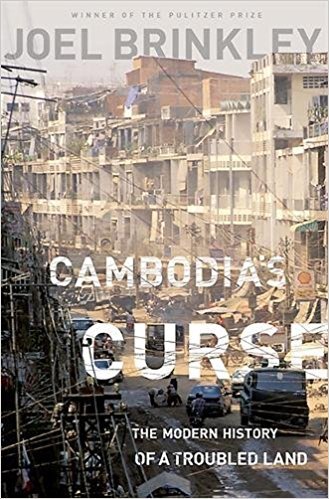 In 2008 and 2009, Brinkley returned to Cambodia to find out. He discovered a population in the grip of a venal government. He learned that one-third to one-half of Cambodians who lived through the Khmer Rouge era have P.T.S.D.--and its afflictions are being passed to the next generation. His extensive close-up reporting in Cambodia's Curse illuminates the country, its people, and the deep historical roots of its modern-day behavior.
In 2008 and 2009, Brinkley returned to Cambodia to find out. He discovered a population in the grip of a venal government. He learned that one-third to one-half of Cambodians who lived through the Khmer Rouge era have P.T.S.D.--and its afflictions are being passed to the next generation. His extensive close-up reporting in Cambodia's Curse illuminates the country, its people, and the deep historical roots of its modern-day behavior.First They Killed My Father: A Daughter of Cambodia Remembers (P.S.)
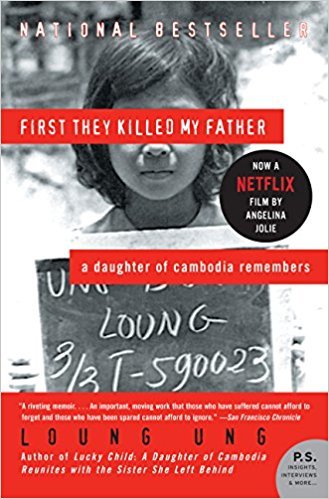 One of seven children of a high-ranking government official, Loung Ung lived a privileged life in the Cambodian capital of Phnom Penh until the age of five. Then, in April 1975, Pol Pot's Khmer Rouge army stormed into the city, forcing Ung's family to flee and, eventually, to disperse. Loung was trained as a child soldier in a work camp for orphans, her siblings were sent to labor camps, and those who survived the horrors would not be reunited until the Khmer Rouge was destroyed.
One of seven children of a high-ranking government official, Loung Ung lived a privileged life in the Cambodian capital of Phnom Penh until the age of five. Then, in April 1975, Pol Pot's Khmer Rouge army stormed into the city, forcing Ung's family to flee and, eventually, to disperse. Loung was trained as a child soldier in a work camp for orphans, her siblings were sent to labor camps, and those who survived the horrors would not be reunited until the Khmer Rouge was destroyed.There are many other fine books that detail that period and its troubling effects, and I recommend you check around and read some. With all that is happening in the world, ignoring the changes going on in SE Asia, given its turbulent history, would be a mistake.
Canadian in a Cambodian Mindfield; American with a Suitcase Full of Sutras
And I'd be remiss if I didn't mention a lighter book on Cambodia. John Pocock initiated this project when I was living in Kampot, Cambodia. He came up with the idea of using my photographs and a series of mental images that we'd use poetically to capture impressions of the place and time. It seemed like fun.
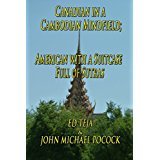 This book was prepared in 2012 and isn't a serious discussion of anything. It is intended to play with ideas, poetic and visual images, that I encountered living there, and twisting them through two different perspectives.
This book was prepared in 2012 and isn't a serious discussion of anything. It is intended to play with ideas, poetic and visual images, that I encountered living there, and twisting them through two different perspectives.
Published on September 09, 2017 11:29
September 6, 2017
Free Humor and Poetry in one volume at no cost
For some reason, my lovely little short story, that satirizes academics, poets, and poetry itself has never gotten much love. Not that people don't like it, but that they never seem to discover it. And that is a shame, because it's fun and free.
THE POTATO PROFESSOR is sort of about potatoes, and it is totally, completely, free at
https://www.books2read.com/u/bWKPpY, which in turn links to Barnes & Noble, Apple, Kobo, and other stores so you can get it in your favorite ebook format without charge. Yes, this free book is free. It's fun, if you like strange. And it's poetic. Maybe that's the problem. Even if poetry isn't your thing, maybe satirizing poetry would tickle your fancy. So give it a try.
I mean it's free, folks. You have nothing to lose but your sanity, and your appreciation of fine poetry, and maybe the respect of your neighbors. There isn't even a sales pitch inside. And the best part is, you can download it, making me happy, but if you never read it, I'll never know. If that isn't a win-win situation, what is?
 https://www.books2read.com/u/bWKPpY
https://www.books2read.com/u/bWKPpY
THE POTATO PROFESSOR is sort of about potatoes, and it is totally, completely, free at
https://www.books2read.com/u/bWKPpY, which in turn links to Barnes & Noble, Apple, Kobo, and other stores so you can get it in your favorite ebook format without charge. Yes, this free book is free. It's fun, if you like strange. And it's poetic. Maybe that's the problem. Even if poetry isn't your thing, maybe satirizing poetry would tickle your fancy. So give it a try.
I mean it's free, folks. You have nothing to lose but your sanity, and your appreciation of fine poetry, and maybe the respect of your neighbors. There isn't even a sales pitch inside. And the best part is, you can download it, making me happy, but if you never read it, I'll never know. If that isn't a win-win situation, what is?
 https://www.books2read.com/u/bWKPpY
https://www.books2read.com/u/bWKPpY
Published on September 06, 2017 15:27
September 3, 2017
Fall has fell -- staying fluid
September always sounds like fall... school starts (has already started in some places) and even though it still feels a lot like summer... the year is flitting away. The ninth month of twelve is already being consumed. It gives me a feeling much like knowing the next to last of some treat I've squirreled away is being eaten.
It's a good time to regroup and rethink. I like this time for doing that better than the year end. All such milestones are as artificial as our Gregorian calendar anyway and this avoids the end of year crush.
So I think about what I'm doing and, sometimes more importantly, how I'm going about trying to achieve my goals. It's an important bit of navel gazing to periodically simply ask: "Is my life going the way I want and what can I do to improve things? What can I do better?
I'm not much at scorekeeping, mind you. This isn't an exercise of seeing if I've met my goals... it's simply a look around to see if I'm on course or if some unnoticed current has set me down and taken me on a longer path. If so, maybe I can correct. Or maybe, the deviation is a good thing.
Years ago, we made our first night crossing on Float Street, going from Grenada (Mt. Hartman Bay) to Trinidad. For the entire night the prevailing wind and current tried to send us to Venezuela. At the time we had no intention of going there, so we fought it, even though it made the passage rough, our skinny boat rocking all night in the high swells.
We were making the passage to do work on the boat, and had our faces and minds set on getting there. That's an example of rigid thinking. We made it fine, and as you see below, we hauled out and did a lot of work on the boat. Too much, probably.
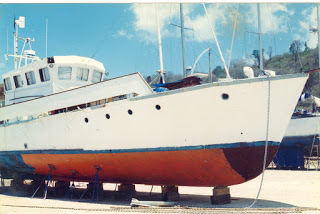 Float Street hauled out at Peake's in TrinidadLater, when we sailed to Venezuela from Trinidad, we loved it there and found it a better place to haul out (at Plout's in Cumana, where all the good fishing boats go). Going there is the first place, not fighting the power of the universe, but listening to it, might have been a better way to go. But you never know ahead of time.
Float Street hauled out at Peake's in TrinidadLater, when we sailed to Venezuela from Trinidad, we loved it there and found it a better place to haul out (at Plout's in Cumana, where all the good fishing boats go). Going there is the first place, not fighting the power of the universe, but listening to it, might have been a better way to go. But you never know ahead of time.
It's a good time to regroup and rethink. I like this time for doing that better than the year end. All such milestones are as artificial as our Gregorian calendar anyway and this avoids the end of year crush.
So I think about what I'm doing and, sometimes more importantly, how I'm going about trying to achieve my goals. It's an important bit of navel gazing to periodically simply ask: "Is my life going the way I want and what can I do to improve things? What can I do better?
I'm not much at scorekeeping, mind you. This isn't an exercise of seeing if I've met my goals... it's simply a look around to see if I'm on course or if some unnoticed current has set me down and taken me on a longer path. If so, maybe I can correct. Or maybe, the deviation is a good thing.
Years ago, we made our first night crossing on Float Street, going from Grenada (Mt. Hartman Bay) to Trinidad. For the entire night the prevailing wind and current tried to send us to Venezuela. At the time we had no intention of going there, so we fought it, even though it made the passage rough, our skinny boat rocking all night in the high swells.
We were making the passage to do work on the boat, and had our faces and minds set on getting there. That's an example of rigid thinking. We made it fine, and as you see below, we hauled out and did a lot of work on the boat. Too much, probably.
 Float Street hauled out at Peake's in TrinidadLater, when we sailed to Venezuela from Trinidad, we loved it there and found it a better place to haul out (at Plout's in Cumana, where all the good fishing boats go). Going there is the first place, not fighting the power of the universe, but listening to it, might have been a better way to go. But you never know ahead of time.
Float Street hauled out at Peake's in TrinidadLater, when we sailed to Venezuela from Trinidad, we loved it there and found it a better place to haul out (at Plout's in Cumana, where all the good fishing boats go). Going there is the first place, not fighting the power of the universe, but listening to it, might have been a better way to go. But you never know ahead of time.
Published on September 03, 2017 10:04
August 31, 2017
The Voice
Writers are commonly told that they need to find their own voice, a way to express their unique vision of the world. That's true. Who wants to sound like everyone else? What reader wants to read someone who doesn't show a personal flair?
It's less often mentioned that an author needs to find the right voice for a particular story. Every story puts its own demands on the writer. He or she is faced with selecting the parts that matter and portraying them in an interesting, effective way (with the reader getting to decide if it is interesting; the effective part is the writer's call.) That can be easy, or hard.
When I wrote THE LEGEND OF RON ANEJO (available at Amazon and everywhere else), the voice was simple enough. The story is intended to be mostly humorous and it's based, loosely (playing free with reality) on real events and people who chose to live around, in, or on boats in the Caribbean. Dagny and I were among them on our boat, and what I saw, the people I met intrigued and amused me and I wanted to capture that life. I took the role of a naive narrator relaying the antics of people around him and the world he was swept up into. Never mind that in the more real world, the one most people live in, I was directly involved. Some might say even an instigator. But nothing was ever proven and we were never caught. I mean charged.
For the book, I took a step back and told the story, focusing on the aspects that I found (dare I say it?) exciting and funny.
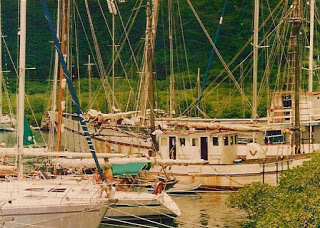 Jammed into the mangroves in Carriacou for a hurricane
Jammed into the mangroves in Carriacou for a hurricane
That was relatively easy. As you can see by the photo above, at times we were all rather cheek and jowl. That provided a ready source of story material for sure. (There was, however, a rather mobile hurricane party in the mangroves that didn't make the book... maybe another time.)
The book I'm writing now is quite different. It's a serious attempt to deal with some issues that I wonder about. What they are, specifically, isn't the difficulty. The challenge is finding a way to address "issues" (see, it's an important word, warranting quotes and everything) with screwing up a perfectly good story. It's a balance between a desire to be a good storyteller and a good writer, which aren't necessarily the same thing. Most successful thriller writers are excellent storytellers. Few do much in the way of elegant or interesting writing.
There's a difference.
Finding that balance, the right approach to this story, is what currently is filling my white boards (yes, plural. I have three) with multiple colored notes, admonitions to self, and various bits and pieces of what I consider good writing. The basic story is powerful and bittersweet. This time it takes place in a border town--in Cambodia.
It's a fun struggle and that kind of challenge is one worth taking on.
It's less often mentioned that an author needs to find the right voice for a particular story. Every story puts its own demands on the writer. He or she is faced with selecting the parts that matter and portraying them in an interesting, effective way (with the reader getting to decide if it is interesting; the effective part is the writer's call.) That can be easy, or hard.
When I wrote THE LEGEND OF RON ANEJO (available at Amazon and everywhere else), the voice was simple enough. The story is intended to be mostly humorous and it's based, loosely (playing free with reality) on real events and people who chose to live around, in, or on boats in the Caribbean. Dagny and I were among them on our boat, and what I saw, the people I met intrigued and amused me and I wanted to capture that life. I took the role of a naive narrator relaying the antics of people around him and the world he was swept up into. Never mind that in the more real world, the one most people live in, I was directly involved. Some might say even an instigator. But nothing was ever proven and we were never caught. I mean charged.
For the book, I took a step back and told the story, focusing on the aspects that I found (dare I say it?) exciting and funny.
 Jammed into the mangroves in Carriacou for a hurricane
Jammed into the mangroves in Carriacou for a hurricaneThat was relatively easy. As you can see by the photo above, at times we were all rather cheek and jowl. That provided a ready source of story material for sure. (There was, however, a rather mobile hurricane party in the mangroves that didn't make the book... maybe another time.)
The book I'm writing now is quite different. It's a serious attempt to deal with some issues that I wonder about. What they are, specifically, isn't the difficulty. The challenge is finding a way to address "issues" (see, it's an important word, warranting quotes and everything) with screwing up a perfectly good story. It's a balance between a desire to be a good storyteller and a good writer, which aren't necessarily the same thing. Most successful thriller writers are excellent storytellers. Few do much in the way of elegant or interesting writing.
There's a difference.
Finding that balance, the right approach to this story, is what currently is filling my white boards (yes, plural. I have three) with multiple colored notes, admonitions to self, and various bits and pieces of what I consider good writing. The basic story is powerful and bittersweet. This time it takes place in a border town--in Cambodia.
It's a fun struggle and that kind of challenge is one worth taking on.
Published on August 31, 2017 07:41
August 24, 2017
Noise Level

Another friend (who is also an author and musician) and I were chatting about ideas for ways to let people know about the new work we are doing and releasing it. It's a moving target. Things work for a time, then they are discovered, someone or several someones produce podcasts about how to use the new channel and monetize it. In short order, the new idea is old hat. It's swamped with individual and corporate pitches.
It doesn't matter whether you are talking about advertising or social media channels or even word of mouth (yes, there are podcasts and seminars on getting your message into the mouth's of friends and relatives). There is nothing inherently wrong with that, I suppose, although it suggest that any useful channel becomes a race to the bottom quickly. But it is discouraging, especially for those of us who are not marketeers and don't want to become marketeers. Life is too short. I'd rather focus on enjoying the world and writing my books and music.
So, instead of becoming good at marketing and having great tips to share with my friend (and you. Of course I'd share with you) I've been studying Yuko Na karate at my neighborhood dojo and working on staying healthy so I can travel and work better, with more enthusiasm and strength (mind and body).
And I'm shifting my direction. If I can't learn how to sell, which is to a great extent because I'm an entrenched and rather stubborn bastard, I'm going to be writing the books I want to write. I can't control, or even influence the markets, but I can control the books I write.
There is a major book coming. It takes place here. I'm well into the story, but the writing, ah the writing will take time.
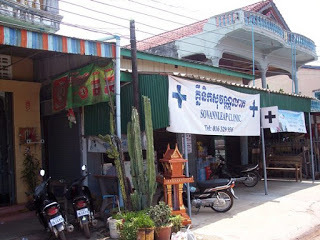
Published on August 24, 2017 11:06
August 21, 2017
When The Sun and Moon Meet Over North America
Why does everyone focus on the sun? It takes two to eclipse.
Traveling Ed Teja and Harper John are both currently based in the Americas but are "on the wrong side of the street in the shadows of the night"
so to speak ...
Both observing the sky, and the chaotic world, and kinda wondering...
...Same Moon
Same Moon, different skies,
Watcha gonna do if the sun don't rise,
and how you gonna look me in the eyes,
It's the same Moon, surprise, surprise.
If you could see me now. Lying with the cowering dogs
of this forgotten town,
That you just lost, and I just found
From the Harper John song ...SAME MOON
The Same Night
Some other moon on the very same nightby Ed Teja, unfinished works
but it's not quite full and the light ain't so bright
I'm on the wrong side of the street in the shadows of the night
It's the same thing I felt before, and it's still not right.
Published on August 21, 2017 08:54

